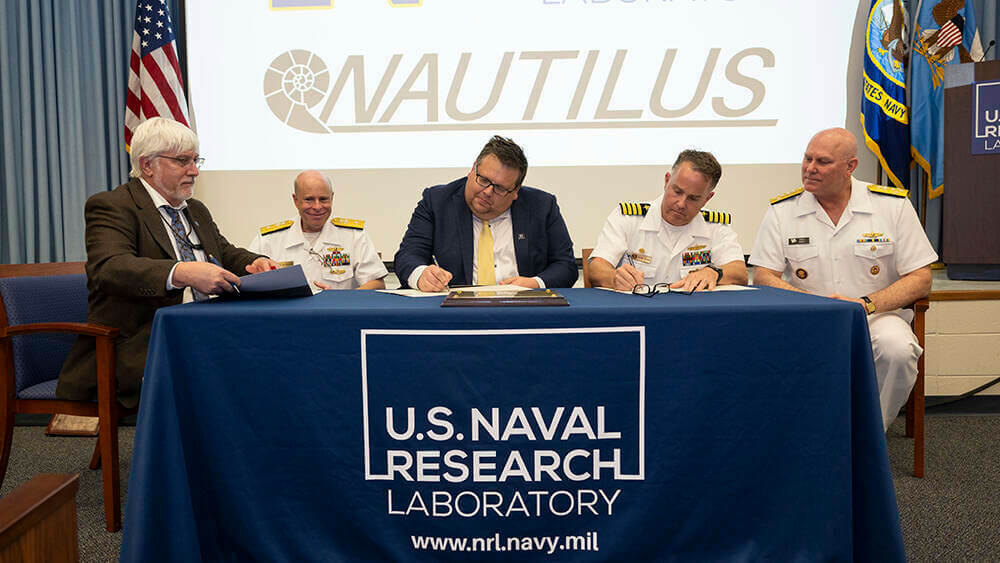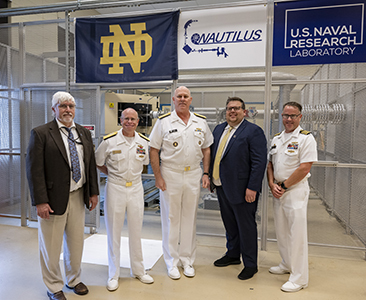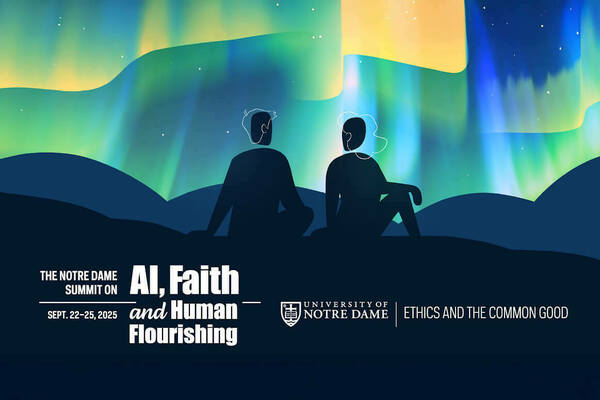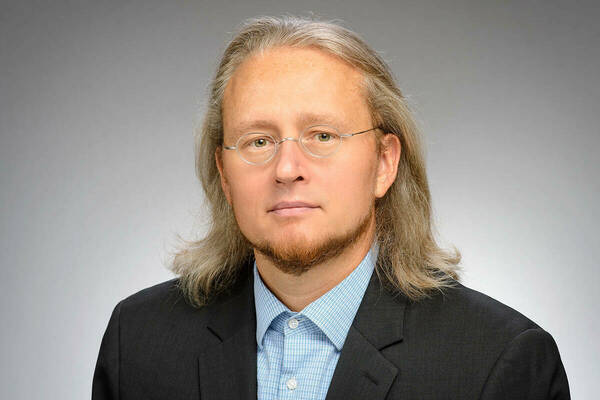Notre Dame receives NAUTILUS, a one-of-a-kind system for materials analysis, from US Navy

The United States Navy has transferred NAUTILUS, a one-of-a-kind system for materials analysis, to the University of Notre Dame. The transfer occurred during a ceremony held at the Naval Research Laboratory in Washington, D.C.
Jeffrey F. Rhoads, vice president for research and professor in the Department of Aerospace and Mechanical Engineering, said, “We are so grateful for our long-standing relationship with the United States Navy. For over 80 years, we have worked together with a shared mission to serve our country and its people, and today is just another example of Notre Dame and the Navy working together to drive innovation for the betterment of the United States.”
Rhoads added that “the transfer of NAUTILUS to our campus in South Bend is not only a generous gift, but it will be an impactful one. At Notre Dame, our researchers will steward it well, using it to explore and discover new knowledge as they advance their research and lean into our research ethos of doing good in the world.”
The name NAUTILUS stands for NAval Ultra-Trace Isotope Laboratory Universal Spectrometer. Unlike other spectrometers, NAUTILUS combines two separate processes for materials analysis. It uses secondary ion mass spectrometry (SIMS) analysis along with single-stage accelerator mass spectrometry (SSAMS). The addition of SSAMS makes NAUTILUS over 10 times more sensitive than commercial SIMS instruments.
Philippe Collon, professor and associate chair in the Department of Physics and Astronomy, explained, “NAUTILUS excels at detecting impurities in a material. It enables what you might call ‘needle in a haystack’ work. But instead of a needle in a haystack, imagine detecting a single bottle of pollutants poured into Lake Michigan — then you have an idea of the kind of extremely precise analysis this instrument is capable of.”
NAUTILUS’ unique capabilities will augment the University’s existing research expertise. As part of one of the world’s longest-running particle accelerator research programs, Notre Dame currently operates several low-energy accelerators.

By transferring NAUTILUS from the Naval Research Laboratory in Washington, D.C., to South Bend, the U.S. Navy will foster collaborative research with Notre Dame faculty members while also making new connections with other universities and national laboratories that will be able to now use NAUTILUS at the University.
“This transfer, authorized by Congress and facilitated through educational partnership agreements, is more than a mere exchange of equipment,” said Adm. Christopher Grady, vice chairman of the Joint Chiefs of Staff and a 1984 Notre Dame graduate. “It is a commitment to fostering further innovation and research that can be applied to Naval and national security challenges, enhancing collaboration between government and academia and strengthening America’s competitive advantage in the global scientific arena.”
Notre Dame researchers said they plan to integrate NAUTILUS into several existing research projects.
For example, Collon will use NAUTILUS to understand the processes that formed our solar system, while Clive Neal, a professor in the Department of Civil and Environmental Engineering and Earth Sciences, will use NAUTILUS to bring a new dimension to his lunar samples. Amy Hixon and Antonio Simonetti, both associate professors in the Department of Civil and Environmental Engineering and Earth Sciences, will use NAUTILUS to test samples from the Ewing Mineral Collection at Notre Dame.
Once NAUTILUS is operational in its new home on Notre Dame’s main campus, it will be the center of a new University-wide research facility managed by the College of Science, the College of Engineering and Notre Dame Research. Researchers from the Institute for Structure and Nuclear Astrophysics (ISNAP) and ND Energy will serve as frequent collaborators, and NAUTILUS will also be available to research groups from outside the University.
According to Collon, some of the biggest benefits of NAUTILUS’ presence at Notre Dame will be for students.
“The next generation of STEM researchers are going to be tasked with doing a more careful analysis of material with smaller and smaller samples to detect things like very advanced forgeries, for example. Students who work with NAUTILUS can learn a comprehensive set of techniques — how to understand ion optics, how to run an accelerator, how to analyze its data and how to optimize tests. That is training we will now be able to offer to our undergraduate and graduate students using this one very advanced piece of equipment.”
To learn more about nuclear science at Notre Dame, visit isnap.nd.edu.
Latest ND NewsWire
- Banks that identify fraudsters increase loyalty, retain more defrauded customers than others who never were compromisedIn a new research study, Vamsi Kanuri, the Viola D. Hank Associate Professor of Marketing at the University of Notre Dame’s Mendoza College of Business, found that banks that identify fraudsters earn customer loyalty and lose customers if they can’t say who was responsible for a fraudulent transaction.
- Notre Dame to host summit on AI, faith and human flourishing, introducing new DELTA frameworkThe Institute for Ethics and the Common Good and the Notre Dame Ethics Initiative will host the Notre Dame Summit on AI, Faith and Human Flourishing on the University’s campus from Monday, Sept. 22 through Thursday, Sept. 25. This event will draw together a dynamic, ecumenical group of educators, faith leaders, technologists, journalists, policymakers and young people who believe in the enduring relevance of Christian ethical thought in a world of powerful AI.
- Notre Dame Democracy Initiative hosts bipartisan conversation with Western state governorsTwo Western state governors known to work across the aisle on policy issues such as water, housing and energy will visit the University of Notre Dame for a fireside chat about how Western state pragmatism can serve as a model for the country to overcome polarization.
- In new research, Roy Scranton explores climate change and the limits of human progressIn his most recent book, “Impasse: Climate Change and the Limits of Progress,” Scranton, an associate professor of English, defines the impasse he sees as “not only political and institutional, but cognitive, existential and narrative” and asserts that the only path forward is through embracing what he terms ethical pessimism. “A lot of people confuse pessimism with nihilism, apathy and despair,” Scranton said. “But pessimism is actually about recognizing our limits, letting go of unrealistic goals, finding solidarity in the fact of human suffering and doing what you can now, not in some utopian future.
- Notre Dame MBA launches deferred admission programThe Notre Dame MBA Deferred Admission Program allows candidates with little or no work experience, including college seniors, to secure admission before reaching the recommended three years of work experience to enroll.
- ‘Prebunking’ false election claims may boost trust in electionsIn recent years, democracies worldwide have seen a growing erosion of trust in election outcomes and institutions, driven in part by fears of widespread fraud. New Notre Dame research finds that “prebunking” — providing accurate information before false claims spread — boosts trust in elections more effectively than traditional fact-checking.













